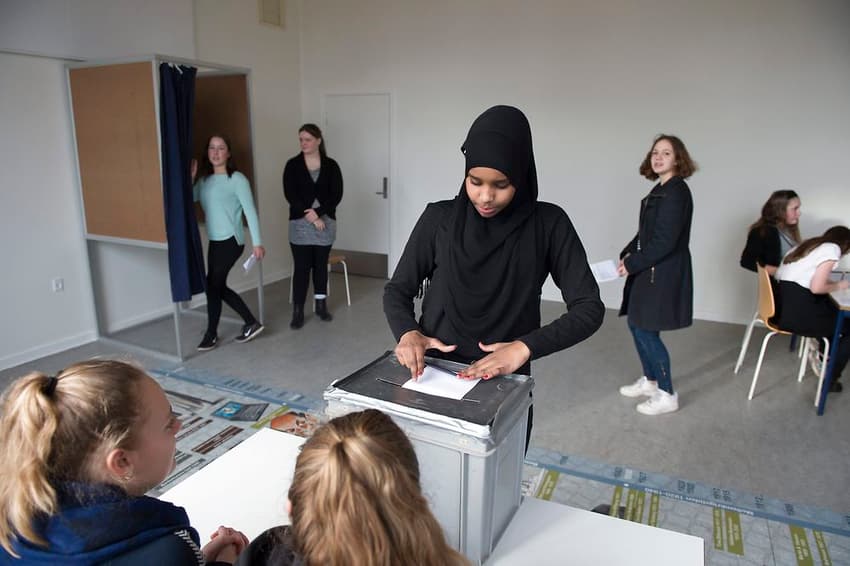Danish youngsters to vote in 'school general elections'

Thousands of teenagers across the country are preparing to cast their votes after Prime Minister Lars Løkke Rasmussen called the 2019 School Election.
In the poll, which does not have any bearing on the real general election, students in the 8th, 9th and 10th grades will cast their ballots for who they think should lead Denmark.
Speaker of the Danish parliament Pia Kjærsgaard said she was looking forward to the project.
“Too many young people think they are unable to make a contribution. But it is young people in particular who can make a contribution, because they will lead society in future,” Kjærsgaard, who will officially start the election at one of the schools registered to take part, said.
Kasper Sand Kjær, chairperson of Dansk Ungdoms Fællesråd (Council for Danish Youth), the organiser of the School Election, said that the project will help young people to engage in politics by giving them a chance to experience it as something tangible and active.
“The School Elections strengthen democratic education. Specifically, this is about showing school students that politics is something you can participate in and not just something you are a spectator to,” Kjær said.
That assessment was supported by Kasper Møller Hansen, professor and researcher of elections at the University of Copenhagen.
Hansen said he was impressed by the close resemblance of the youth elections to the real thing.
Giving young people the experience of entering a voting booth before they reach the age of 18 helps promote confidence and political understanding, he said.
“It demystifies (elections) and shows that they aren’t so difficult. You don’t need specific opinions, a certain level of knowledge or to be good at politics classes to be able to vote. No, we can all vote, and we have a duty to do so,” Hansen said.
Not all schools have registered to take part in the youth elections and that could result in a skewed outcome, the researcher added.
“There may be a slightly incorrect picture of how Denmark’s youth is made up if you simply take an average, because the schools which are struggling the most tend to be the ones which are unable to take part,” he said.
The School Elections will take place on January 31st, with a party at Christiansborg, the seat of Denmark’s parliament, to take place after the result has been revealed.
READ ALSO: Denmark's elections are the ‘best in the world': report
Comments
See Also
In the poll, which does not have any bearing on the real general election, students in the 8th, 9th and 10th grades will cast their ballots for who they think should lead Denmark.
Speaker of the Danish parliament Pia Kjærsgaard said she was looking forward to the project.
“Too many young people think they are unable to make a contribution. But it is young people in particular who can make a contribution, because they will lead society in future,” Kjærsgaard, who will officially start the election at one of the schools registered to take part, said.
Kasper Sand Kjær, chairperson of Dansk Ungdoms Fællesråd (Council for Danish Youth), the organiser of the School Election, said that the project will help young people to engage in politics by giving them a chance to experience it as something tangible and active.
“The School Elections strengthen democratic education. Specifically, this is about showing school students that politics is something you can participate in and not just something you are a spectator to,” Kjær said.
That assessment was supported by Kasper Møller Hansen, professor and researcher of elections at the University of Copenhagen.
Hansen said he was impressed by the close resemblance of the youth elections to the real thing.
Giving young people the experience of entering a voting booth before they reach the age of 18 helps promote confidence and political understanding, he said.
“It demystifies (elections) and shows that they aren’t so difficult. You don’t need specific opinions, a certain level of knowledge or to be good at politics classes to be able to vote. No, we can all vote, and we have a duty to do so,” Hansen said.
Not all schools have registered to take part in the youth elections and that could result in a skewed outcome, the researcher added.
“There may be a slightly incorrect picture of how Denmark’s youth is made up if you simply take an average, because the schools which are struggling the most tend to be the ones which are unable to take part,” he said.
The School Elections will take place on January 31st, with a party at Christiansborg, the seat of Denmark’s parliament, to take place after the result has been revealed.
READ ALSO: Denmark's elections are the ‘best in the world': report
Join the conversation in our comments section below. Share your own views and experience and if you have a question or suggestion for our journalists then email us at [email protected].
Please keep comments civil, constructive and on topic – and make sure to read our terms of use before getting involved.
Please log in here to leave a comment.